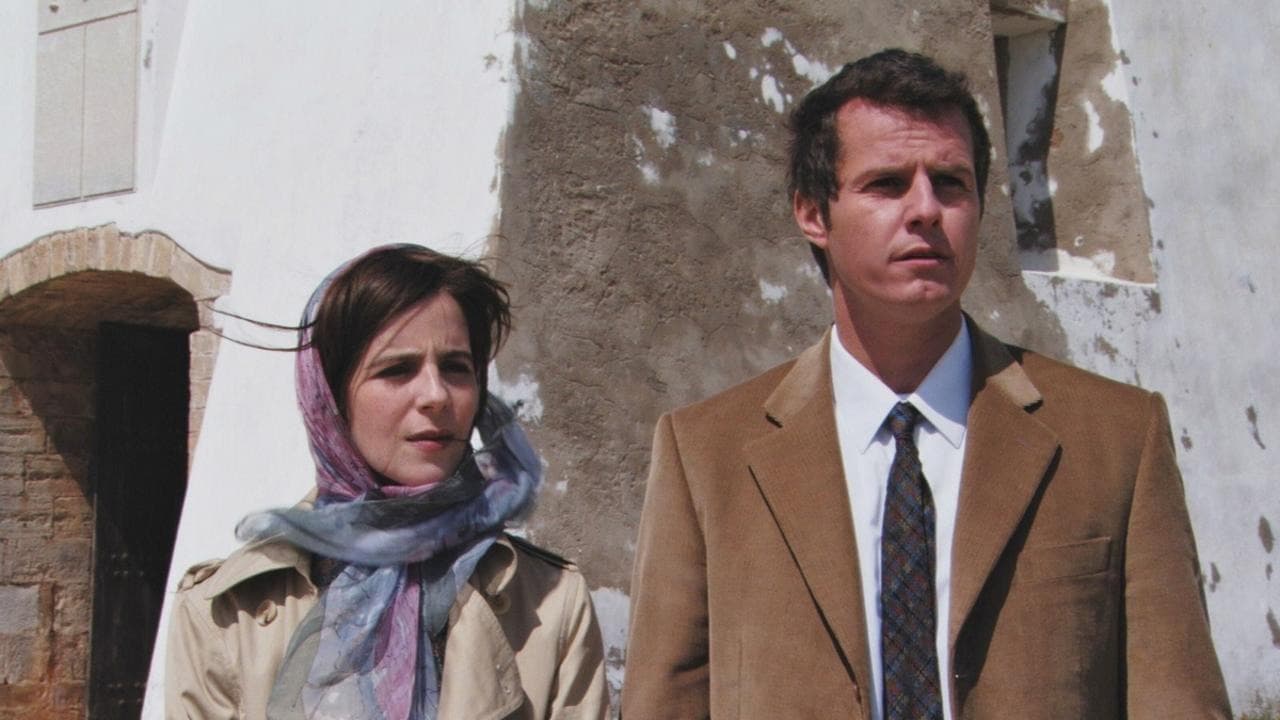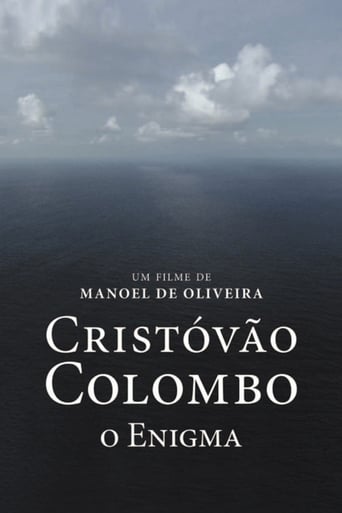

SERIOUSLY. This is what the crap Hollywood still puts out?
... View Moreif their story seems completely bonkers, almost like a feverish work of fiction, you ain't heard nothing yet.
... View MoreWhile it is a pity that the story wasn't told with more visual finesse, this is trivial compared to our real-world problems. It takes a good movie to put that into perspective.
... View MoreStrong acting helps the film overcome an uncertain premise and create characters that hold our attention absolutely.
... View MoreThis film, as many on Manoel de Oliveira filmography, was made on a small budget, and it shows.Nevertheless tells a story based on a investigation that proves Colombo was Portuguese. Under a secret mission (working for Portuguese crown) trying to create a diversion for Spanish.Whilst Portuguese were making huge profits from the India maritime route (through South Africa), and knowing South America richness (gold, wood, and many other valuable goods), Spanish were sent on a (supposedly) wrong direction.Bad luck (or not?!?) they found new land. Carabean islands including Cuba. This is what makes it all interesting: this island was named be Colombo wish; why? Because there's a small village in Portuguese Alentejo, named...you guessed: Cuba! And there are also investigations showing this theory has every aspect to be right. Of course, Portuguese XVth century intelligence tried to delete all traces to Colombo genealogy.And there is no interest (Spanish and Italian) to investigate this theory deeply. That's why Colombo is still and hero claimed by many (Spain, Italy and USA) although the truth is probably a completely different story...
... View MoreThe movie has terrible actors. Even young actors from the Portuguese soap-operas are better. Well, when most of actors are from the family, the best actors from this movie are then the American secondary actors. It is more than obvious that this movie was made only to get some money to pay the holidays of all Oliveira's family to USA and Madeira. The sound is awful, as well as the image. A kid could do a movie with a better argument. In the end, everybody becomes convinced that Colombus wasn't Portuguese with again terrible arguments! The movie cannot has 1/10, since it has still one funny part: "Oh Silvia!..." when the old actress (director's wife) forgets her lines. A terrible pseudo-nationalist movie, as a old men's crank.
... View MoreI wasn't expecting much of this movie, not that it was an Oliveiras', I really respect his work, but because of what i read about it.He had this story he wanted to tell and made a decision about how to do it. A risky and brave decision. It's not made to please a massive public nor the artistic cinema lovers. It sometimes looks like a thesis presentation or a documentary with perfectly shooted scenes.It's a journey that takes you along with a couple in the quest for the true nationality of the man who discovered the American continent. And an appeal to keep fresh in our memories the golden age of Portugal's history.For those who say that looks artificially due to the unnatural dialogs, you're right. But it's suppose to. The characters talk to you through the screen telling you that the world is small, finite and theones who first notice that where the Portuguese. I think that was thepoint of the movie. And for that matter, the cinematography was amazinglycontextualised.A Portuguese movie about Portugal, by the main reference of this country's cinema. And if you were born here, you should watch it.
... View MoreIn my book of references, Manoel de Oliveira has an unique approach to cinema. And that is because of two aspects, which show vivid here as few times before in his career.Most viewers (specially the Portuguese) will stand on a like/dislike position based on the immediately visible "flaws":- the dialog, which is old fashioned, inadequate in practically any moment, out of context, definitely not cinematic in the vision we have today (and have had for many years) of what a film dialog should be (sound?) like. This dialog constantly explains (too) many things, in devices to provide the spectator with information on dark areas of the plot which many times are so denounced that become childish. -than the acting, which is many times just awful, and other times more melancholic and over-dramatic than the speeches of say "gone with the wind". If you, dear reader, think you are smart because you detected all this, you're not. it's all true, and i don't care about any of that.And i don't care, because of two things: The first one has to do with "placement". Oliveira is a true master in the way he "places" things in his films. He places vision, his camera is most of the time still (not that much in this film, actually). That has to do with his conception of cinema as filmed theatre, but i really see in this the ability to summarize, and tell a mood/dialog/sentiment just by looking at it. Antonioni tried similar stuff later in his life, but Oliveira is a master in this. A curious note is that here, his sense of visual placement is strangely (to Oliveira's patterns) close to what Antonioni might have done. The camera moves a lot here, and i call attention to the scenes in Alentejo, the road shots. One of them, in which the eye of the camera is not on the road, we watch for some moments the camera following the car. This way of shooting a landscape placing an action in it, which becomes fundamental though shot at distance, is something Antonioni did so well. Check also the placement of characters. They always start a scene walking, coming from somewhere and stop in determined positions to serve the placement chosen for the camera. So it's not about how the camera found the characters, but how the characters serve the camera. In the very beginning we have an interesting shots alternating up down angles with low up angles, in Lisbon's Terreiro do Paço. The second aspect i truly enjoy has to do with Oliveira's very personal way of working with layers of reality, fiction, and fictionalized reality. The peak of this exploration of layers was in "Viagem ao princípio do Mundo", which i place on a special list of films i truly believe can change something about you after (and while) you watch it. There we had a layer of fictionalized reality (that of the actor), an historical account (portuguese past political context) and the layer of Oliveira's memory. Here he replaces the fiction for the real story of a real couple, and layers his own personal layer on that couple. He gets more economic here, but "viagem..." was far deeper, visually and in terms of narrative. Let's check it here: we have Manuel Luciano (who by happy coincidence has the same first name as our director) and we have his wife. They will serve as a motive for a kind of road/travel film. They search the clues leading to a supposed retelling of the origins of Cristopher Columbus. Though creating around Columbus a strong theory, that may also be fiction over reality. Than we have the third layer. Oliveira plays Luciano as an old man (and his grandson plays him as a young man) and has his wife playing Luciano's wife. I personally feel that Oliveira at a certain point was shooting mainly this third layer. So we have a number of scenes, with Oliveira and his wife in close shots. They talk. I don't think they're acting. I think they're being themselves. Like in Sunset Boulevard, we are constantly inside and outside reality/ies. One of these shots is worth mention: they both seat on an interior. They talk about their past lives , i think about their own lives, not the lives they're performing, she proclaims her love for him, he answers he loves her, and he kisses her on the face. They get shy like two adolescents. He is 99. She is 10 years younger. This has to be one of the most poignant love scenes in the story of cinema, and the climax of this good film. The scene alone makes the experience worthwhile.So, superficially (to my view) the film is about the retelling of an historical worldwide known biography, following with that purpose the lives of a couple who studied the subject. In a deeper meaning, this is about "connections". It's about linking subjects, themes, places, and specially memories. That's why the story talks about linking loose points, unexplained historical issues. The separated shots here are also interlinked. That's why we have a shot looking at the sea in Dighton corresponding to a shot looking at the Atlantic in Porto Santo; or shots looking through windows in several places throughout the journey. In one particular shot, a bridge is being crossed in Alentejo, an iron bridge, we have a shot at all close to what Oliveira did with bridge D.Luiz in "douro faina fluvial", this is his own cinematic memory. Vision... Memory, Love, Luciano loves his wife and his research, Oliveira loves his wife, and cinema...My opinion: 4/5 should this be put together in a more united way, and the acting/dialogs not be so badly thrown in some moments, and this could be something to change your imagination. Oh and the music is great.http://www.7olhares.wordpress.com
... View More